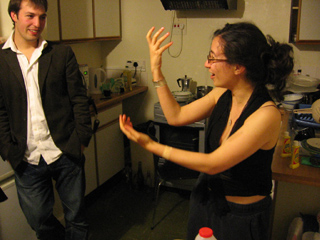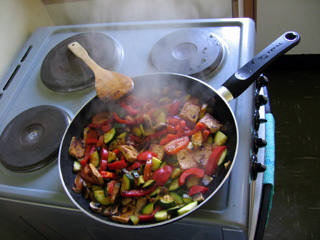
Photo from www.thenaturalcoast.com
Since I was feeling vaguely ill all day, I made lunch and dinner stir-fries with large amounts of ginger. I don’t know why, but I’ve always found that ginger helps with nausea and general feelings of being unwell. The captain of the Duen first told me about it, during the first LIFEboat flotilla. A floating sustainability conference which took place on more than a dozen tall ships, the LIFEboat flotilla was one of the best weeks of my life, even though I was ridiculously seasick for much of it, on account of gale force winds and huge waves.
The Duen was a small ship – far smaller than the Pacific Swift, which was my berth for the second Flotilla. When tacking upwind, the boat listed at an angle of about thirty degrees, with me clinging to the upper lip in a borrowed survival suit: lent to me because I had to be on deck in the pouring rain all the time because I was so seasick. For years afterwards, I couldn’t stand the sight, smell, or taste of scones, because that’s what people kept trying to feed me. Despite all that, spending a week traveling through British Columbia’s Gulf Islands in a tall ship is an amazing experience. More so when you’re in a group like the one Jeff Gibbs created and which has been supported by people like David Suzuki and Jane Goodall, who I actually met during the first flotilla.
Leadership Initiative for Earth (LIFE) is a Vancouver based environmental organization that I was involved with for several years. I attended a conference of theirs at a high school with Jonathan. I then took part in two Flotillas, each of which required a large amount of environmentally related community service in order to be eligible. Jonathan and I worked at the Wild Bird Trust in North Vancouver, planting trees and pulling out poles from a frozen swamp. We also had to give presentations and slide shows afterwards. I gave one at the Vancouver Folk Festival, after the second flotilla. It was really excellent, because I got a free Folk Festival pass in the process.
One of the best things about the two flotillas was learning a bit of marine navigation. Because of the complexity of the Gulf Islands and their tides, the importance of maps, navigation, and location there are considerable. There are many passes that can only be used at certain times, because of the tides. During the second flotilla, I got to help with the coordination of the fleet overall: managing where different ships would stop at different times. The flotilla mostly took place on the ships, interacting with the members of your group, but there were also excursions on shore. We visited a sustainably harvested forest and got to touch sea cucumbers brought up by divers.
I wish I had some photos to post, but they are all in Vancouver in non-digital form. The one above wasn’t taken by me, but it does show the ship I was on for the first flotilla, in a place much like many we visited.
The original WildLIFE conference happened in 1995, when I was only twelve. As such, I probably didn’t get as much from it as most participants, nor was I able to contribute very effectively. The Flotillas were in 1997 and 1998, respectively. Since then, I’ve largely lost touch with the organization. The only participant with whom I’ve had any contact is Kevin Millsip, one of the two leaders of my group in 1996. He is now a Trustee on the Vancouver School Board; perhaps Sasha Wiley will meet him one day.
At one point, it seemed that LIFE had changed its name. At other points, I couldn’t seem to find anything about it at all. I am glad to see that they seem to be active at the moment. Apparently, “there have now been five Flotillas, all extraordinary learning adventures for the 750 youth who participated.” I wish I had stayed in contact with members of my two groups. At the time, I think being rather younger than most of the other participants impacted my ability to relate directly with them. Even so, I am incredibly glad to have been involved.
I strongly suspect the whole LIFE experience has impacted on my choice of discipline and sub-field. To be simultaneously exposed to a place as beautifully alive as the Gulf Islands and such a group of committed and motivated people is a powerful combination, as Gibbs must have anticipated. I am sure my fellow participants are also grateful for his imagination and initiative.
 Walking home from the third and least well attended bloggers’ gathering, through this city of strangers, I found myself thinking about the law. It has been a frequent topic of contemplation for me, of late. The way in which the common law, especially, tries to marry thought with power is fascinating. Precedents, rules of interpretation, and styles of thinking are all part of a complex and self-referential body that nonetheless manages to produce a high degree of coherence and maintain broad respect. People may not have much faith in lawyers, in particular, but there is a high level of faith in the system in its entirety. The contrast with something as amorphous (and oft derided) as ‘international relations’ is welcome.
Walking home from the third and least well attended bloggers’ gathering, through this city of strangers, I found myself thinking about the law. It has been a frequent topic of contemplation for me, of late. The way in which the common law, especially, tries to marry thought with power is fascinating. Precedents, rules of interpretation, and styles of thinking are all part of a complex and self-referential body that nonetheless manages to produce a high degree of coherence and maintain broad respect. People may not have much faith in lawyers, in particular, but there is a high level of faith in the system in its entirety. The contrast with something as amorphous (and oft derided) as ‘international relations’ is welcome.

 Caffeine – a molecule I first discovered as an important and psychoactive component of Coca Cola – is a drug with which I’ve had a great deal of experience over the last twelve years or so. By 7th grade, the last year of elementary school, I had already started to enjoy mochas and chocolate covered coffee beans. When I was in 12th grade, the last year of high school, I began consuming large amounts of Earl Gray tea, in aid of paper writing and exam prep. During my first year at UBC, I started drinking coffee. At first, it was a matter of alternating between coffee itself and something sweet and delicious, like Ponderosa Cake. By my fourth year, I was drinking more than 1L a day of black coffee: passing from French press to mug to bloodstream in accompaniment to the reading of The Economist.
Caffeine – a molecule I first discovered as an important and psychoactive component of Coca Cola – is a drug with which I’ve had a great deal of experience over the last twelve years or so. By 7th grade, the last year of elementary school, I had already started to enjoy mochas and chocolate covered coffee beans. When I was in 12th grade, the last year of high school, I began consuming large amounts of Earl Gray tea, in aid of paper writing and exam prep. During my first year at UBC, I started drinking coffee. At first, it was a matter of alternating between coffee itself and something sweet and delicious, like Ponderosa Cake. By my fourth year, I was drinking more than 1L a day of black coffee: passing from French press to mug to bloodstream in accompaniment to the reading of The Economist.

